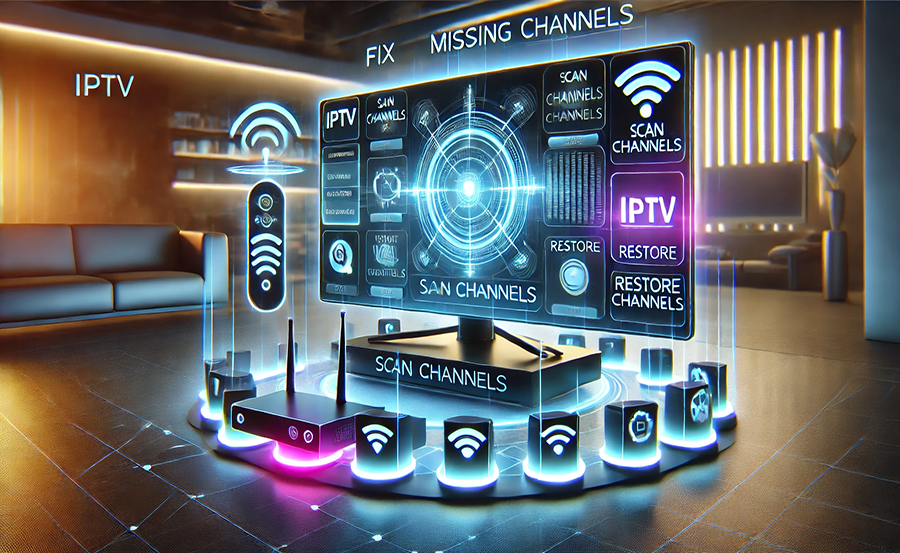Mastering IPTV Streaming: How to Overcome Network Jitters
In an era where digital content is king, IPTV streaming has taken the lead, offering viewers unprecedented access to a world of entertainment. Yet, one issue continues to plague even the most effortless streaming experiences—network jitters. These annoying disruptions can make or break your viewing experience, especially when you are relying on IPTV for your source of entertainment. In this comprehensive guide, we explore effective strategies to eliminate network jitters, with a focus on how Rapid IPTV—the Simplest IPTV on Earth—can enhance your streaming like never before. wants Buy 1 Year IPTV Subscription
Understanding Network Jitters
To battle any foe, you must first understand it. Network jitters are essentially the variability in packet arrival times during data transmission. In simpler terms, it’s when the flow of data gets unexpectedly choppy, causing interruptions in your streaming content. This can happen for a host of reasons, including network congestion or insufficient bandwidth.
Think of network jitters like bumpy roads on your drive—you want the smoothest roads for the most enjoyable journey. And when you’re streaming your favorite shows or matches via IPTV, you certainly want an undisturbed experience.
What Causes Network Jitters?
Several factors contribute to network jitters, and understanding these can help you tackle them more effectively. Common causes include:
- Network congestion: Heavy internet traffic can lead to delays and packet loss.
- Insufficient bandwidth: Not enough bandwidth prevents smooth streaming.
- Outdated hardware: Old routers and outdated firmware often become bottlenecks.
With these in mind, it’s vital to address these root causes for smoother IPTV streaming.
Impacts of Network Jitters on IPTV Streaming
Jitters can significantly lower the quality of your IPTV streaming, leading to a range of problems such as:
- Buffering: Frequent stops to load the stream negatively impact viewer experience.
- Image quality reduction: To cope with jitter, streams may downgrade quality.
- Audio sync issues: Desynced audio and video disrupt immersion.
For both casual viewers and those invested in IPTV as their main source of television, these issues can be quite frustrating.
Solutions to Mitigate Network Jitters
Fortunately, several strategies can help mitigate network jitters. Let’s dive into practical approaches that you can apply right away.
Optimizing Your Network Setup
First, consider optimizing your existing network setup. Ensure that your router is placed in a central location to maximize coverage and minimize interference. Additionally, using an Ethernet cable instead of relying on Wi-Fi can provide a more stable and reliable connection.
Furthermore, updating your router’s firmware and ensuring that your hardware supports the latest networking standards can make a noticeable difference.
Prioritize Traffic
Modern routers often come equipped with Quality of Service (QoS) settings. These allow you to prioritize certain types of traffic, such as IPTV, over others like background updates or downloads. Configuring QoS can help ensure smoother streaming by managing available bandwidth.
Investing in Rapid IPTV – The Simplest IPTV on Earth
One of the best investments you can make for seamless IPTV streaming is choosing a reputable provider like Rapid IPTV. Known as the Simplest IPTV on Earth, Rapid IPTV is designed with cutting-edge technology to minimize network jitters.
With its robust server infrastructure, Rapid IPTV ensures a high-quality streaming experience, allowing you to bypass common connectivity issues. The platform’s setup process is straightforward, and customer support is readily available to assist with any potential hurdles.
Regular Monitoring and Adjustment
Monitoring network performance can go a long way in identifying and fixing jitter issues. Utilize tools to check your connection’s latency, bandwidth, and jitter regularly. This practice helps you pinpoint times of day when network congestion is typically high and adjust your streaming habits accordingly.
Implementing these adjustments in tandem with early solutions helps foster a buffer-free viewing experience on platforms like Rapid IPTV.
The Role of Rapid IPTV in Eliminating Jitters
Beyond personal strategies, the choice of your IPTV provider plays a crucial role in the minimization of network jitters. Rapid IPTV stands out by providing a next-level solution.
Streamlining Packet Delivery
Rapid IPTV excels in optimizing data packet delivery, which directly reduces the likelihood of jitter. Their technology ensures that data is transmitted efficiently, maintaining consistent and high-quality video streams to your device.
By managing server loads effectively and maintaining a global presence, Rapid IPTV circumvents common pitfalls leading to network inefficiencies.
Tailored Solutions for Varied Needs
Understanding that one-size-fits-all doesn’t work for every user, Rapid IPTV offers tailored plans that ensure you have exactly what you need in terms of bandwidth and content access. This customization plays a key role in further minimizing jitter and enhancing your viewing experience.
Uninterrupted Support
Moreover, Rapid IPTV’s dedicated support team is an added advantage. Whether you encounter a technical difficulty or need assistance with setup, their support ensures that you never miss a beat in your streaming endeavors.
Concluding Thoughts: Your Path to Buffer-Free Streaming
The dream of interruption-free IPTV streaming is within reach when you take proactive steps against network jitters. By optimizing your network setup, choosing a reliable provider like Rapid IPTV, and continuously monitoring network health, you can ensure a superior streaming experience.
Through an understanding of network jitters and the benefits of Rapid IPTV, you’re equipped to transform challenges into seamless IPTV streaming. Remember, the key lies in consistent performance and unmatched reliability, both hallmarks of the Simplest IPTV on Earth.
Frequently Asked Questions

What exactly are network jitters?
Network jitters refer to the irregular delays during data packet delivery over a network, leading to disruptions in streaming quality. They’re like potholes in the digital highway interrupting smooth travel.
How does Rapid IPTV reduce network jitters?
Rapid IPTV reduces network jitters through optimized server infrastructure and efficient data packet management, ensuring reliable and high-quality streaming experiences.
Can outdated hardware affect IPTV streaming?
Yes, outdated hardware can become a bottleneck, leading to network inefficiencies and streaming interruptions. Updating routers and firmware can significantly improve performance.
Why is Ethernet preferred over Wi-Fi for streaming?
Ethernet connections offer more stability and reliability compared to Wi-Fi, reducing the chances of interference and providing a steady data transmission for streaming.
How can I monitor my network to prevent jitters?
Using network monitoring tools can help you assess connection quality in terms of latency, bandwidth, and jitter—pointing out peak congestion periods and allowing timely adjustments.
Is Rapid IPTV suitable for all types of users?
Yes, Rapid IPTV offers various plans tailored to different needs, ensuring optimal streaming for varying bandwidth requirements and viewer preferences.
Introducing LG’s Best IPTV Features Using M3U Links

